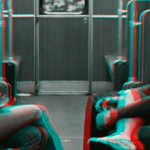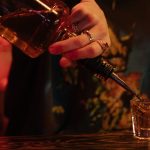When my father was fifty-one, he had a son, Christopher, with his much younger second wife Amanda. Chris got everything my sister and I didn’t have: private school, saxophone lessons, and, worst of all, our father’s devotion. At one point Dad even coached Chris’s soccer team, which enraged me; I’d vented by joking that Dad might have a heart attack in the field and topple over in the bright grass. But my sister Bess did not look amused by this forecast, only concerned.
It pissed me off that Dad had a second chance to be a successful father, with a successful child.
Yesterday Bess and I went to Chris’s high school graduation in San Francisco. We had to sit through Chris’s valedictorian speech where he thanked his parents for always supporting him. “Barf,” I whispered. Bess frowned at me.
Chris’s graduation party was at a night club in North Beach called Groucho’s. Chris’s friends were there, the boys wearing what I assumed were their fathers’ ties, and the girls in slip dresses and high heels they walked in gingerly, gazelles picking their way across ice. Plenty of Dad’s and Amanda’s friends came. Amanda wore a dress with puffy cap sleeves like loofahs.
As a graduation party, it didn’t make a lot of sense. Where was the bruised lawn covered with solo cups, the parents out of town, the illegal keg? This felt more like a wedding reception. It made me wonder if Dad thought he wouldn’t be around for Chris’s wedding, so he was trying to roll a lot of milestones into one event, like one of those miniature travel-games that had pieces for chess, backgammon, and checkers.
I parked myself by the raw bar. The caterers served sushi and oysters on giant platters of chipped ice. I was still paying off my student loans from fourteen years ago; Chris was going to Columbia, my father, as far as I knew, entirely footing the bill. I wanted to eat enough sushi to balance those scales.
Chris got up on the platform stage and held the mic in both meaty hands. He was wearing a navy blue jacket; his hair lapped over his forehead in a smooth wave. His neck was thick, like a thigh. He made a toast, thanking his parents, yet again, and thanking “My sisters Bess and Audrey for being here.” He flashed his teeth. His friends looked at us in a curious way, like it was news to them we existed.
I ate so much sushi and so many oysters that I felt nauseated. I went outside to the back deck, but smoking wasn’t allowed even there. The brick wall bristled with trumpet vine.
After a while Bess came outside and looked at me, like what’s wrong with you?
“It isn’t fair,” I said.
She said, “It’s not about fairness.” For atheists like us, fairness wasn’t what Bess called a “thing.” If one believed in God, she postulated, life had a certain geometric design. Virtue was rewarded by salvation: but suffering was also rewarded. The meek inherited the earth. There was compensation.
“And badness is punished—” I said. I tried to articulate why I felt so angry. It seemed to me that Dad was to blame for all my problems in life: my having two student jobs in order to pay for college which meant mediocre grades and eventually a workplace injury from falling off a ladder restocking coffee filters which led to a problem with painkillers which led to what Bess sometimes refers to as “your rough years.” Now I was thirty-three, still paying off loans, and what did I have to show for myself? And why did Dad get a second chance? And why did Chris not suffer even a speck?
Bess said, “But you know, Audrey, we’re doing okay.” I looked at Bess’s eyes, the color of faded jeans, and considered how in some ways that was true—she had Owen, she had her job at the organic juice company where one pineapple-ginger juice was named after her—and in some ways, not so much: they’d lost their house in the Santa Ana fire. I said that second part out loud.
Bess laughed and said, “Is Dad Zeus? The fire wasn’t Dad’s fault.” Of course, neither was her endometriosis, which I knew was very painful partly because, thanks to me, Bess was freaked out by painkillers, even Advil. It seemed cruel to me in a cosmic way that her suffering was not rewarded, or even treatable.
I pointed out that my credit was shot, so I was stuck in my shitty rent-controlled apartment in Sacramento with beige wall-to-wall carpeting.
Bess said, “You always did hate wall-to-wall carpeting.” Then I felt like an asshole, because Bess’s house, which she’d loved, especially her kitchen with the red tile floor, had burned down.
“But hey, we’re doing okay,” she repeated, soothingly. She looked at me like she could see into the very back of my brain, all the spiky things jostling there, the cacti and nettles. She put her arms around me, my kind sister, flexing her enviable capacity to accept.
…
Biography
Kim Magowan is the author of the short story collection How Far I’ve Come (2022), The Light Source (2019), and Undoing (2018), which won the 2017 Moon City Press Fiction Award. Her stories have been selected for Best Small Fictions and Wigleaf’s Top 50. She is the Editor-in-Chief and Fiction Editor of Pithead Chapel. kimmagowan.com
Image: unsplash.com





